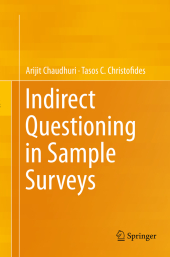 Neuerscheinungen 2016Stand: 2020-02-01 |
Schnellsuche
ISBN/Stichwort/Autor
|
Herderstraße 10
10625 Berlin
Tel.: 030 315 714 16
Fax 030 315 714 14
info@buchspektrum.de |

Arijit Chaudhuri, Tasos Christofides
(Beteiligte)
Indirect Questioning in Sample Surveys
Softcover reprint of the original 1st ed. 2013. 2016. xiii, 177 S. 1 SW-Abb. 235 mm
Verlag/Jahr: SPRINGER, BERLIN; SPRINGER BERLIN HEIDELBERG 2016
ISBN: 3-662-51255-6 (3662512556)
Neue ISBN: 978-3-662-51255-5 (9783662512555)
Preis und Lieferzeit: Bitte klicken
This book reviews techniques of indirect questioning, including various versions of randomized response, the item count technique, the nominative technique, the three-card method and negative surveys, and explores the key aspect of protecting privacy.
Indirect questioning is a crucial topic in surveys of human populations. When the issue is about a stigmatizing characteristic (for example about illegal drug use), standard survey methodologies are destined to fail because, as expected, people are not willing to reveal incriminating information or information violating their privacy. Indirect questioning techniques have been devised so that the privacy of participants in a sample survey is protected and at the same time good estimates of certain parameters (e.g. the percentage of people in a certain community who use illegal drugs) can be delivered. The topic is modern and still under development.
Indirect Questioning in Sample Surveys represents a collection of the most important and recent techniques of indirect questioning, including various versions of randomized response, the item count technique, the nominative technique, the three-card method, non-randomized response models and negative surveys, while also exploring the key aspect of protecting privacy.
Preface.- A Plea for Indirect Questioning: Stigmatizing Issues of Social Relevance.- Specification of Qualitative and Quantitative Parameters Demanding Estimation.- Various Indirect Questioning Techniques.- Randomized Response Techniques to Capture Qualitative Features.- Quantitative Issues Bearing Stigma: Parameter Estimation.- Indirect Techniques as Alternatives to Randomized Response.- Protection of Privacy.- Index.
"This monograph presents a wide span of modified and innovative methods besides RRT including other kind of indirect querying, such as item count, nominative, three-card method, nonrandomized techniques, and surveys with negative questions. ... Each chapter contains a list of references to the recent sources. The monograph can help lecturers, graduate students, and researchers working with modern survey sampling techniques." (Stan Lipovetsky, Technometrics, Vol. 59 (4), November, 2017)
"This is a good book to help with gathering information about sensitive characteristics in surveys. ... This is a good book. I look forward to digging into it and figuring out how to write computer programs for some of the techniques." (Mary Anne, Cats and Dogs with Data, maryannedata.com, May, 2015)


